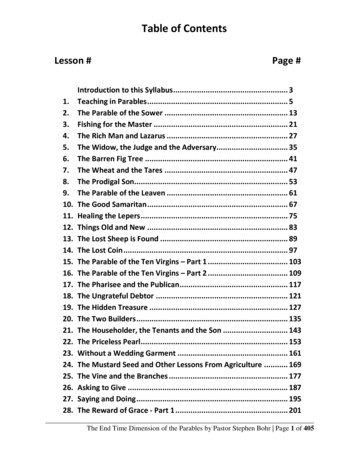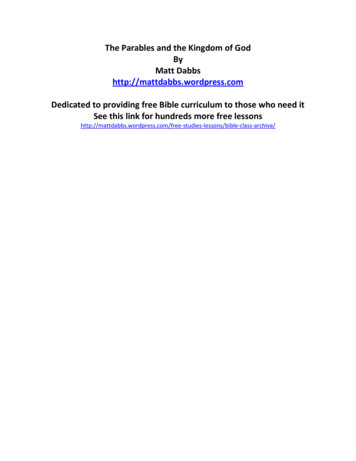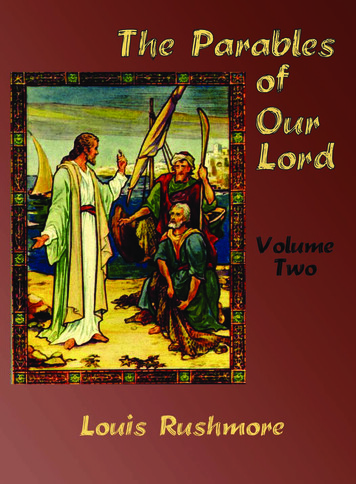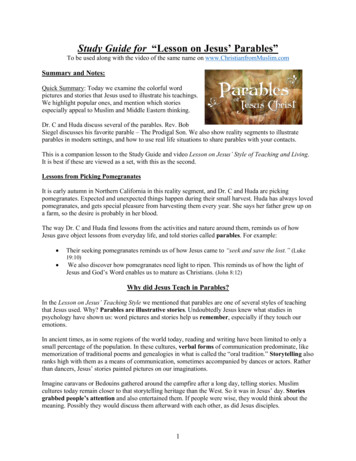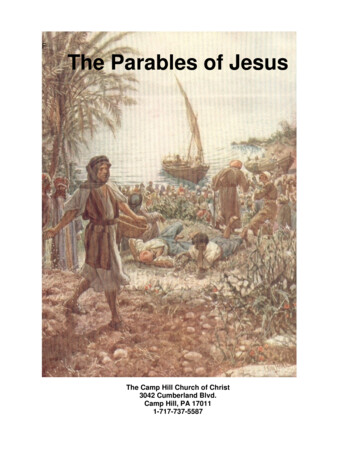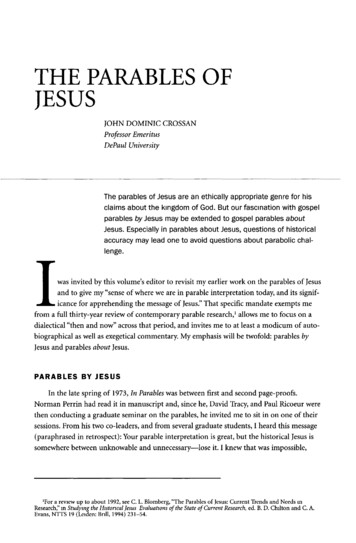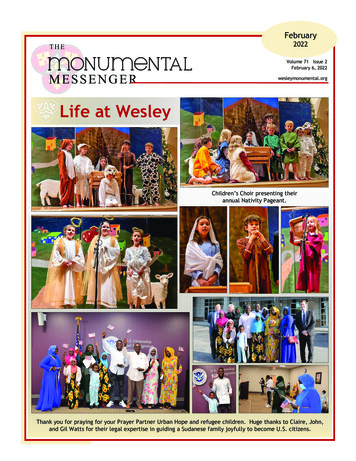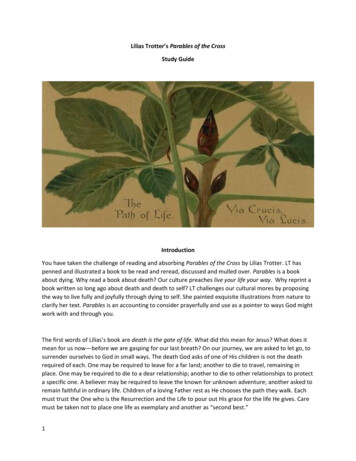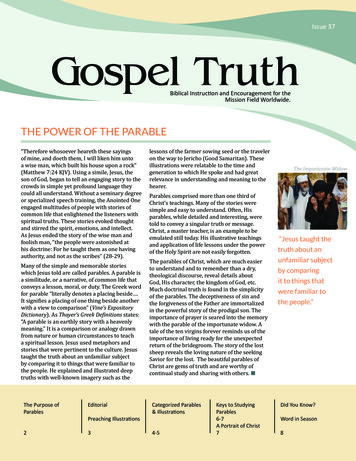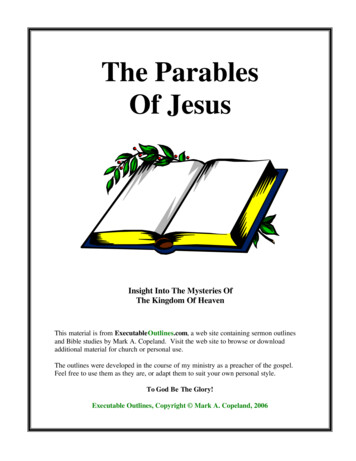
Transcription
The ParablesOf JesusInsight Into The Mysteries OfThe Kingdom Of HeavenThis material is from ExecutableOutlines.com, a web site containing sermon outlinesand Bible studies by Mark A. Copeland. Visit the web site to browse or downloadadditional material for church or personal use.The outlines were developed in the course of my ministry as a preacher of the gospel.Feel free to use them as they are, or adapt them to suit your own personal style.To God Be The Glory!Executable Outlines, Copyright Mark A. Copeland, 2006
Mark A. CopelandThe Parables Of JesusTable Of ContentsIntroduction To The Parables (Mt 13:1-3,10-17)Defining The Kingdom Of Heaven (Mt 13:11)The Sower [The Four Soils] (Mt 13:3-9,18-23The Wheat And The Tares (Mt 13:24-30,36-43)The Mustard Seed (Mt 13:31-32)The Leaven (Mt 13:33)The Hidden Treasure (Mt 13:44)The Pearl Of Great Price (Mt 13:45-46)The Dragnet (Mt 13:47-50)The Householder (Mt 13:51-52)The Unmerciful Servant (Mt 18:21-35)The Laborers In The Vineyard (Mt 20:1-16)The Two Sons (Mt 21:28-32)The Wicked Vinedressers (Mt 21:33-46)The Wedding Feast (Mt 22:1-14)The Wise And Foolish Virgins (Mt 25:1-13)The Talents (Mt 25:14-30)The Growing Seed (Mk 4:26-29)The Two Debtors (Lk 7:41-43)The Good Samaritan (Lk 10:25-37)The Friend At Midnight (Lk 11:1-13)The Rich Fool (Lk 12:13-21)The Barren Fig Tree (Lk 13:6-9)Taking The Lowest Place (Lk 14:7-11)The Great Supper (Lk 14:15-24)The Lost Sheep (Lk 15:1-7)The Lost Coin (Lk 15:8-10)The Prodigal Son (Lk 15:11-32)The Unjust Steward (Lk 16:1-15)The Rich Man And Lazarus (Lk 16:19-31)The Unprofitable Servants (Lk 17:7-10)The Persistent Widow (Lk 18:1-8)The Pharisee And The Tax Collector (Lk 18:9-14)The Minas (Lk 19:11-27)The Parables Of 88184879094921021041061092
Mark A. CopelandThe Parables Of JesusIntroduction To The Parables (Mt 13:1-3,10-17)INTRODUCTION1. During His earthly ministry, as Jesus went about preaching and teaching, He frequently usedparables - cf. Mt 13:1-3, 13:34-35a. It has been estimated that at least one-third of Jesus’ recorded teaching is found in the parables(Wiersbe, “Windows On The Parables”, p. 15)b. Certainly many of the most often remembered sayings of Jesus are His parables2. It is therefore proper for disciples today to ask such questions as:a. What is a “parable”?b. Why did Jesus teach in parables?c. What are they about?d. How should we interpret them?3. With this lesson, we begin a study on “The Parables Of Jesus”.a. This first lesson will serve as an introduction to the parables in generalb. Succeeding lessons will examine the parables in particular[Let’s begin this “Introduction To The Parables” by noticing.]I. THE DEFINITION OF “PARABLE”A. THE WORD “PARABLE”.1. Is a transliteration of the Greek word “parabole” (para-bow-LAY)2. Means “to place beside, to cast alongside”3. As defined by Vine’s Expository Dictionary of N.T. Words , it “signifies a placing of onething beside another with a view to comparison”4. Wiersbe’s description of a parable.a. As “a story that places one thing beside another for the purpose of teaching”b. “It puts the known next to the unknown so that we may learn”5. A parable can usually be identified by the use of the word “like” - cf. Mt 13:31,33B. AS USED IN THE NEW TESTAMENT, A PARABLE.1. Is usually a story or narrative drawn from nature or human circumstances2. From which spiritual lessons can be made by comparison-- A common definition of a parable is “an earthly story with a heavenly meaning”[The next question often raised is “Why did Jesus teach in parables?” In other words, why did henot simply speak straightforward when He was teaching? To understand why, consider.]II. THE PURPOSE OF THE PARABLESA. THE PRIMARY PURPOSE WAS TO “CONCEAL”.1. Jesus began speaking in parables because of the hardness of many people’s heartsThe Parables Of Jesus3
Mark A. Copeland- cf. Mt 13:10-17a. The disciples’ attitude was such that they were blessed to learn “the mysteries of thekingdom of heaven” - Mt 13:10-12, 16-17b. But because of the hard hearts of many in the multitude, Jesus began speaking to themin parables - Mt 13:13-15; cf. Mk 4:10-12c. He would then explain the parables in private to His disciples - Mk 4:33-342. By resorting to parables, Jesus effectively separated the truth seekers from the curiosityseekers!a. Those seeking the truth would say “Explain to us the parable.” - Mt 13:36b. Whereas the simply curious could easily be sent away3. Indeed, Jesus used parables to carry out Divine judgment. - cf. Mt 13:12a. “For whoever has (a good heart, listening ears), to him more will be given, and hewill have abundance (by virtue of the parable being explained)”b. “But whoever does not have (a good heart, listening ears), even what he has willbe taken away from him (by virtue of being sent away with the multitude)”B. BUT ANOTHER PURPOSE WAS TO “REVEAL”.1. Even though the primary purpose in telling parables was to conceal the “mysteries of thekingdom of heaven” from the multitude!a. For once the disciples understood the basic meaning of the parables.b. .the comparison of the “known” (earthly) truths with the “unknown” (heavenly) truthswould shed further light on the unknown2. Therefore, with the help of the Lord’s explanation of His parables we can learn more about“the mysteries of the kingdom of heaven” - cf. Mt 13:34-35[This leads us to the next question, “What are the parables about?” Mt 13:11 certainly gives us aclue.]III. THE THEME OF THE PARABLESA. THE GENERAL THEME IS “THE KINGDOM OF HEAVEN”.1. As suggested by Mt 13:112. As illustrated with several parables, which all start with “The kingdom of heaven islike.” - Mt 13:24,31,33,44,45,473. Indeed, the “kingdom of heaven” was the theme of.a. Jesus’ itinerant ministry - Mt 4:17,23b. His sermon on the mount - Mt 5:3,10,19-20; 6:10,33; 7:21B. THREE “SUB-THEMES” ARE STRESSED IN THE PARABLES.1. The character of the KINGDOM - for example.a. The Parable of the Mustard Seedb. The Parable of the Leavenc. The Parable of the Hidden Treasured. The Parable of the Pearl of Great Price2. The character of the KING - for example.a. The Parable of the Workers in the Vineyardb. The Parable of the Lost Son3. The character of the KING’S SUBJECTS - for example.a. The Parable of the Good SamaritanThe Parables Of Jesus4
Mark A. Copelandb. The Parable of the Persistent Widow[Of course, the sub-themes often overlap in some parables, but they clearly demonstrate that the overalltheme of the parables was “the kingdom of heaven.” Finally, a few thoughts in answer to the question,“How do we interpret the parables?”]IV. THE INTERPRETATION OF THE PARABLES OF JESUSA. THERE ARE TWO EXTREMES TO AVOID.1. Seeking to find some spiritual truth in every little detail2. Saying that there is only ONE spiritual truth in each parableB. SOME GUIDELINES FOR PROPER INTERPRETATION.1. Learn from the explanations Jesus gave in those parables He explaineda. Understanding the parable of the sower helps us to understand other parables - Mk4:13b. Jesus therefore went on to explain that parable.2. Look for the CENTRAL truth of the parable, making sure that any other truths gleanedfrom the parable are in harmony with it3. Consider carefully the CONTEXT of Jesus words.a. Looking for an introduction or an application which may give insightb. As supplied by either the Lord Himself, or His inspired writers4. Don’t use the parables to formulate new doctrinea. Remember, parables were originally told to conceal, so they are not always that clear intheir meaningb. Therefore don’t try to build a case for a doctrine based solely on a parableCONCLUSION1. Following these sensible guidelines to interpreting the Parables of Jesus, we can look forward to thejoy of understanding more fully “the mysteries” or revealed truths of the kingdom of heaven2. As we get into the parables themselves, I hope that we will appreciate how blessed we are to live inan age when people who have a desire to learn about the kingdom can do so:“But blessed are your eyes for they see, and your ears for the hear;“for assuredly, I say to you that many prophets and righteous men desired to see whatyou see, and did not see it, and to hear what you hear, and did not hear it.” (Mt 13:1617)3. What we are about to study in these parables concern things which Abraham, Moses, David,Isaiah, Jeremiah, Ezekiel, Daniel, and many others looked forward to, but did not fully understand intheir lifetime!4. Yet these “mysteries of the kingdom of heaven” (Mt 13:11), containing “things kept secretfrom the foundation of the world” (Mt 13:35), are now being made known through thepreaching of the gospel of Christ:The Parables Of Jesus5
Mark A. Copeland“Now to Him who is able to establish you according to my gospel and the preaching ofJesus Christ, according to the revelation of the mystery kept secret since the worldbegan”“but now has been made manifest, and by the prophetic Scriptures has been madeknown to all nations, according to the commandment of the everlasting God, forobedience to the faith;” (Ro 16:25-26)Dear friend, have you yet rendered obedience to the faith by responding to the call of the gospel ofChrist? - cf. Mk 16:15-16The Parables Of Jesus6
Mark A. CopelandThe Parables Of JesusDefining The Kingdom Of Heaven (Mt 13:11)INTRODUCTION1. In our introductory lesson, we observed that the general “theme” of Jesus’ parables was “thekingdom of heaven”a. Many of the parables start with “The kingdom of heaven is like.” - Mt 13:24,31,33,44,45, 47b. In explaining why He spoke in parables, Jesus made reference to “the mysteries of thekingdom of heaven” - Mt 13:112. We also noted that “the kingdom of heaven” was the theme of.a. Jesus’ itinerant ministry - Mt 4:17,23b. His sermon on the mount - Mt 5:3,10,19-20; 6:10,33; 7:213. Because “the kingdom of heaven” is such a prominent subject in the parables of Jesus (as well asHis overall preaching).a. I thought it might serve a good purpose to preface our study of the parables with a careful lookat what “the kingdom of heaven” meansb. With a proper definition of “the kingdom of heaven” fresh in our minds, we are more likely tobenefit from our Lord’s teaching on this wonderful subject![Let’s begin our effort to define “the kingdom of heaven” by comparing it with “the kingdom of God”.]I. THE KINGDOM OF HEAVEN vs. THE KINGDOM OF GODA. IS THERE A DIFFERENCE?1. Some try to make a distinction (e.g., Scofield Reference Bible)2. But a quick comparison of the gospels indicate that the terms refer to the same thinga. Cf. Mt 4:17 with Mk 1:14-15b. Cf. Mt 5:3 with Lk 6:20c. Cf. Mt 13:31 with Mk 4:30-31B. WHY THE DIFFERENT EXPRESSIONS?1. We find that Matthew used the expression “kingdom of heaven” almost exclusively, whilethe other gospel writers used the phrase “kingdom of God”2. It may be that since Matthew wrote his gospel to the Jews, he chose to used thephrase “kingdom of heaven”.a. Because of the Jews’ reluctance to use the name of God (out of reverence)b. Because of the Jews’ misconception of the coming kingdom1) Many anticipated a physical kingdom2) The expression “heaven” (literally, “heavens”) would emphasize a spiritual kingdom[So our first observation is that any effort to distinguish between the “kingdom of heaven” and the“kingdom of God” is really without warrant.The Parables Of Jesus7
Mark A. CopelandLet’s now consider what Jesus meant when He spoke of the “k ingdom of heaven”.]II. IT INVOLVES FOUR INTERRELATED CONCEPTSA. THE REIGN OF GOD.1. The term “kingdom” as used by the Jews often stressed the abstract idea of “reign” or“dominion”, not some geographical area surrounded by physical boundariesa. Possibly used this way by Jesus in Lk 17:21b. It is used this way by Jesus in Mt 6:10 (“Thy kingdom come; thy will be done”)2. Thus, the “kingdom of heaven” (or “kingdom of God”) is wherever the REIGN orDOMINION of God (who is in heaven) is manifesteda. In one sense, the kingdom of God has always existed - cf. Psa 47:2; 103:19b. But in a special way was the rule or reign of God to be manifested with the coming ofChrist1) As foretold in the time of Daniel (ca. 500 B.C.) - Dan 2:44-452) As proclaimed by John the Baptist - Mt 3:1-33) As preached by Jesus - Mt 4:17; Mk 1:14-153. Indeed, it is in the Person of Jesus Christ that the “reign of God” is being expressly manifesttoday - cf. 1 Co 15:23-26; Ep 1:20-22; 1 Pe 3:22; Re 1:5B. SPIRITUAL IN NATURE.1. The kingdom (or reign of God) would not be found in the form of a physical kingdom- Jn 18:362. It would manifest itself in spiritual ways - Ro 14:17C. VISIBLY MANIFESTED TODAY IN THE LORD’S CHURCH.1. What is the Lord’s church?a. It is a community of soulsb. In whose hearts God is recognized as Sovereign-- Thus the church can properly be referred to as the kingdom of God today2. That the terms “church” and “kingdom” can be used interchangeably, consider:a. How “church” and “kingdom” were used by Jesus - Mt 16:18-19b. Comments made to those who were in the church - Co 1:13; 1 Th 2:12c. The description of those in the churches of Asia - Re 1:4,6,9D. BOTH PRESENT AND FUTURE.1. The “kingdom of heaven” has a future element as well as a present one2. Its future aspect is spoken of by:a. Jesus in Mt 25:34b. Paul in 1 Co 15:50; 2 Ti 4:18c. Peter in 2 Pe 1:10-113. Peter described the coming of its future state in 2 Pe 3:10-13-- Therefore the kingdom of heaven involves the “new heavens and new earth”[These four concepts or elements must be kept in mind whenever we think of the “kingdom of heaven”.Failure to remember all four can easily lead to misconceptions about the nature of the kingdom.In an effort to clarify this subject even further, consider.]The Parables Of Jesus8
Mark A. CopelandIII. A SUMMARY DEFINITION OF THE KINGDOM OF HEAVENA. IN THE “PRESENT” SENSE.1. It is found wherever the SOVEREIGNTY OF GOD is accepted in the hearts of men2. It is a SPIRITUAL KINGDOM, for God rules in the hearts of men3. Its outward manifestation today is the LORD’S CHURCH4. The kingdom was “INAUGURATED” on the Day of Pentecost in Acts 2B. IN THE “FUTURE” SENSE.1. The kingdom will be “CULMINATED” with the coming of the Lorda. When Jesus “delivers the kingdom to God the Father” - 1 Co 15:24b. “Then the righteous will shine forth as the sun in the kingdom of their Father.” - Mt13:432. It will be that “NEW HEAVENS AND NEW EARTH” described by Peter and Johna. “In which righteousness dwells” - 2 Pe 3:13b. In which “the tabernacle of God is with men, and He will dwell with them, and they shallbe His people, and God Himself will be with them and be their God.” - Re 21:33. It will be experienced only by those in the church who are submitting to God’s willa. Those who do “the will of My Father in heaven” - Mt 7:21-23b. Those who are “diligent to be found by Him in peace” - 2 Pe 3:13-15aCONCLUSION1. As we get into the parables, there will be many references to the “kingdom of heaven”a. Sometimes it appears Jesus refers to the “present” aspect of the kingdomb. But then, at other times He has reference to the “future” aspect of the kingdom2. Hopefully, this effort to define the “kingdom of heaven” will help us appreciate more what Jesus hasto say concerning “the mysteries of the kingdom of heaven”!One principle concerning entering kingdom that was a mystery to Nicodemus at first was the need to beborn again (Jn 3:3-4). But then Jesus explained that the new birth was one of water and the Spirit (Jn3:5). Is that still a mystery to you? Then consider Acts 2:38 and Titus 3:5.The Parables Of Jesus9
Mark A. CopelandThe Parables Of JesusThe Sower [The Four Soils] (Mt 13:3-9,18-23)INTRODUCTION1. As Jesus went about preaching the gospel of the kingdom of heaven (cf. Mt 4:17,23), He did notalways find a receptive audience.a. Even where He did mighty works, some did not repent - Mt 11:20-24b. Some sought to trick Him, so they might have reason to accuse Him - Mt 12:9-14-- It was for this very reason that Jesus began teaching publicly in “parables” - Mt 13:10-132. The problem Jesus faced was that many people, though they had ears to hear, their ears hadbecome “hard of hearing” - Mt 13:14-153. To illustrate this problem, Jesus told a parable that has come to be known as “The Parable OfThe Sower”a. It can also be properly called “The Parable Of The Four Soils”b. Or “The Parable Of The Seed”-- It was told by Jesus to illustrate different reactions to the gospel message4. The parable itself is recorded in Mt 13:3-9 (also Mk 4:3-9; Lk 8:4-8) - PLEASE READa. It is one of the few parables in which we actually have Jesus’ own interpretation of the parableb. The significance of this particular parable is enhanced by the words of Jesus recorded in Mk4:13.“Do you not understand this parable? How then will you understand all parables?”[The value of this parable becomes clearer in the light of Jesus’ explanation, for by it we can seeourselves as we really are in regards to how we have received the Word into our lives.]I. EXPLANATION OF THE PARABLEA. “THE SOWER”1. Not specifically mentioned, but compare Mt 13:37a. This is in explanation of “The Parable Of The Wheat And The Tares”b. In which Jesus explains “He who sows the good seed is the Son of Man”2. So it is likely that the “sower” in this parable had immediate reference to Jesus3. But it is a fair use of the parable to apply it today to anyone who faithfully proclaims themessage of the Son of ManB. “THE SEED”1. The seed is “the word of the kingdom” - Mt 13:19a2. I.e., the gospel of the kingdom, which was the theme of Jesus’ preaching - Mt 4:233. It was also an important element of apostolic preaching - cf. Ac 8:12; 28:30-31C. “THE WAYSIDE” (The First Soil)1. This soil represents one who “hears.and does not understand” - Mt 13:19aThe Parables Of Jesus10
Mark A. Copeland2. Most likely, these are those who have hardened their hearts prior to hearing the Word - cf.Mt 13:153. The “birds” represent “the wicked one” (called “the devil” in Lk 8:12)a. Who snatches away the Word from those whose hearts are hardenedb. Their condition therefore is one of being “blinded” by Satan to the gospel - cf. 2 Co 4:3-44. While Satan contributes to their blindness, it is precipitated by their own hardness of heart!D. “THE STONY PLACES” (The Second Soil)1. This soil represents the one who.a. “hears the word and immediately receives it with joy” - Mt 13:20b. “yet he has no root in himself, but endures only for a while” - Mt 13:21ac. “when tribulation or persecution arises because of the word, immediately he stumbles”- Mt 13:21b2. Some hear the Word and receive it with great joy.a. But with no root, they are not grounded in the Wordb. So that when troubles arise, there is no endurance and stumbling occurs3. Here we learn that an emotional reception without a strong foundation based upon theWord will not enable one to stand against tribulation and persecutionE. “AMONG THE THORNS” (The Third Soil)1. This soil represents the one who.a. “hears the word” - Mt 13:22ab. But whose ability to bear fruit is choked by:1) “the cares of this world” - Mt 13:22b2) “the deceitfulness of riches” - Mt 13:22c3) “pleasures of life” (added in Lk 8:14)2. How these three “thorns” can cause us to be unfruitful is explained in other portions ofGod’s Word.a. The cares of this world1) Can cause us to be unprepared - cf. Lk 21:34-362) The evil in cares and anxieties is that they can detract our minds from what is trulyimportant - cf. Lk 12:29-32b. The deceitfulness of riches1) The danger is described in 1 Ti 6:9-102) Again, the evil in riches lay in diverting our attention away from God, and feelingself-sufficient - 1 Ti 6:17c. Pleasures of life1) Those involving the flesh in particular divert our minds from the things of the Spirit- cf. Ga 5:172) Sowing to the flesh make it impossible to reap of the Spirit! - Ga 6:7-9F. “THE GOOD GROUND” (The Fourth Soil)1. This soil represents the one who.a. “hears the word and understands it” - Mt 13:23ab. “indeed bears fruit and produces” - Mt 13:23bb. Luke adds that he hears “the word with a noble and good heart”, and then “keeps it andbears fruit with patience” - Lk 8:152. Those with “a noble and good heart”, then, are the ones.The Parables Of Jesus11
Mark A. Copeland3.4.5.6.a. Who will understand the Wordb. Who will keep it, and with patience produce fruit in their lives!They will be like the Bereans, who were commended for being “fair- minded”, as manifestedin the way they:a. “received the word will all readiness”b. “searched the Scriptures daily to find out whether these things were so” - Ac 17:11Note the importance of “understanding” in relation to “bearing fruit”.a. Jesus made the connection between the two in this parable - Mt 13:23b. Paul connects the two when he writes of the gospel producing fruit among theColossians “since the day they heard (NASV says “understood”) the grace of God intruth” - Co 1:5-6-- When one “understands”, they will more likely “bear fruit”; but the key to understandingis having a “good and noble heart” that is willing to listen and learn!And what kind of “fruit” will one bear? There are different kinds.a. The fruit of winning souls to Christ - Ro 1:13b. The fruit of practical holiness - Ro 6:22c. The fruit of sharing material things - Ro 15:27d. The fruit of the Spirit (i.e., a Christ- like character) - Ga 5:22-23e. The fruit of good works - Co 1:10f. The fruit of praise & thanksgiving - He 13:15An important observation is that not all will bear the same amount.a. “some a hundredfold, some sixty, some thirty” - Mt 13:23b. As illustrated in The Parable of the Talents, some may be given more according to theirability to use what God has given them - Mt 25:14-15c. Whatever our ability, we should exercise it accordingly - cf. 1 Pe 4:10-11[With the explanation provided by Jesus Himself, we should have little problem understanding TheParable of The Sower and the spiritual truths Jesus was teaching.However, it is one thing to understand it, quite another to make application of it. Seeking to makeapplication in a thought-provoking way, let me ask “What kind of soil are you?”]II. APPLICATION OF THE PARABLEA. ARE YOU LIKE “THE WAYSIDE”?1. If you have heard the gospel of Christ and His kingdom, but are not yet a Christian.2. You may be in the process of hardening your heart the longer you wait!3. You are susceptible to Satan’s deception in some form, to blind you and not allow theWord of God to have its intended effect!B. ARE YOU LIKE “THE STONY PLACES”?1. If you responded to the gospel at one time, but are not being grounded in the faith.2. You will likely fall away when persecution or temptation comes your way!C. ARE YOU LIKE THE SOIL “AMONG THE THORNS”?1. If you responded to the gospel at one time, but are becoming too preoccupied with thecares, riches, and pleasures of this world.2. You will not be able to bear much fruit!-- And remember what Jesus said about branches that don’t bear fruit! - Jn 15:1-6The Parables Of Jesus12
Mark A. CopelandD. ARE YOU LIKE “THE GOOD SOIL”?1. If you have responded to the gospel, and are bearing fruit.2. Then you have demonstrated several important things:a. You have a good and noble heart!b. You have come to understand the Word!c. You have been keeping it with patience!3. And so the Word of God has been able to produce its intended effect in you!CONCLUSION1. When Jesus finished telling His parable of the Sower, He cried out:“He who has ears to hear, let him hear!” - Mt 13:92. Clearly from the explanation of Jesus Himself, we learn that not all those who have ears to hear,really listen!3. It is important that we listen well when God’s Word is being proclaimed, for that is how faith isobtained - Ro 10:174. How well have YOU listened to this parable of Jesus and His explanation?a. If you are anything other than that like “the good soil”, you need to repent today!b. For in the next study, we learn what Jesus will do when He comes to gather His kingdom!- cf. Mt 13:24-30,36-43Dear friends and brethren, may you truly have a good and noble heart.hear, examine, understand, andaccept the gospel of Christ and the gospel of His kingdom!The Parables Of Jesus13
Mark A. CopelandThe Parables Of JesusThe Wheat And The Tares (Mt 13:24-30,36-43)INTRODUCTION1. In “The Parable Of The Sower”, we learned that not all people react to the Word of thekingdom in the same waya. Some with hard hearts and dull ears would not even allow the Word time to germinate in theirheartsb. Others would receive the Word, but either persecution or things in this life would render themfruitlessc. Only those with good and noble hearts, who receive the Word with patience, and keep it, willbear the intended fruit in their lives-- Thus the “mysteries of the kingdom of heaven” will be received only by some, and not all2. This truth was illustrated further when Jesus taught “The Parable Of The Wheat And Tares”.a. Recorded only by Matthew, the parable itself is found in Mt 13:24-30 (READ)b. Jesus’ purpose is clearly to teach principles related to “the kingdom of heaven”1) For he begins with “The kingdom of heaven is like.”2) Therefore Jesus intends to reveal principles related to the “rule of God” as it would soon bemanifested in the Person of His Son3. Like “The Parable Of The Sower”, this parable is one of the few in which we have Jesus’ ownexplanation.a. The explanation was given in response to the disciples’ inquiry - Mt 13:36b. And the explanation is found in Mt 13:37-43 (READ)[In this study, we shall focus on Jesus’ explanation of the parable, and then draw some truths from it.]I. THE PARABLE EXPLAINEDA. IN ANSWER TO THE DISCIPLES’ REQUEST, JESUS IDENTIFIES.1. THE SOWER - “He who sows the good seed is the Son of Man”a. I.e., Christ, who in His preaching when about proclaiming the gospel of the kingdom- cf. Mt 4:23b. Who is identified in Daniel’s vision as one who received a kingdom - Dan 7:13-14c. Who after His ascension claimed to have received such authority - Re 2:26-27; 3:212. THE FIELD - “The field is the world”a. Into which the Son of Man came to sow the seedb. Over which the Son of Man now exercises His authority, i.e., His kingship - cf. Mt28:18; 1 Pe 3:22; Re 1:53. THE GOOD SEED (WHEAT) - “The good seeds are the sons of the kingdom”a. Those who gladly own Jesus as their Lord and King, submitting to Him freelyb. I.e., His disciples, who observe all that He commands - cf. Mt 28:19-20c. When we compare this with “The Parable Of The Sower”, we come up with slightlymixed metaphors.1) The disciples are those who constitute the “good soil”, in which the seed has beenThe Parables Of Jesus14
Mark A. Copeland4.5.6.7.sown (The Parable Of The Sower)2) But in The Parable Of The Wheat And Tares, the disciples are the “good seed”themselvesd. Thus, when one receives the “seed” of the kingdom (the Word of God), they become“good seed” (a son of the kingdom)THE TARES - “The tares are the sons of the wicked one”a. Those later defined as they that.1) Offend2) Practice lawlessness - cf. Mt 13:41b. Though within the realm of the Lord’s reign (for the Lord will later gather them out ofHis kingdom), they clearly are not submitting to the Lord’s authority!c. Their actions reveal that they are really “sons of the wicked one”!THE ENEMY - “The enemy who sowed them is the devil”a. Who tried to tempt Christ and failed - cf. Mt 4:1-11b. Who now tries to destroy the efforts of Christ to save souls and enlarge the influence ofHis kingly ruleTHE HARVEST - “The harvest is the end of the age”a. That “age” in which.1) The gospel of the kingdom is being preached2) People who receive the gospel can become the “sons of the kingdom”-- I.e., the present gospel dispensation - cf. Co 1:13; Re 1:9b. An “age” that will end with a great “harvest”, identified elsewhere as the glorious comingand appearance of our Lord - cf. Mt 26:31-32; 1 Ti 6:14-15THE REAPERS - “The reapers are the angels”a. Angels will accompany Christ when He comes again - 2 Th 1:7-9b. They will separate the wicked from among the just - cf. Mt 13:49[Having identified the various elements of the parable.]B. JESUS STRESSES THE MAIN POINTS OF THE PARABLE.1. In verse 40.a. The problem of the “tares” will not be fully addressed until the “harvest”b. This is done out of consideration for the “good seed” (cf. Mt 13:29)2. In verse 41.a. It is at the end of the age that the Son of Man will finally resolve this problemb. With His angels He will “gather out of His kingdom all things that offend, and those whopractice lawlessness” (i.e., the sons of the wicked one)3. In verse 42.a. Those so gathered out of His kingdom will properly dealt with!b. Cast into “the furnace of fire”, where there will be “wailing and gnashing of teeth!”4. In verse 43.a. The blessedness of the “righteous” (the good seed, the sons of the kingdom) isdescribedb. After the harvest they will “shine forth as the sun in the kingdom of their Father”![Jesus ends His explanation of the parable with the same admonition that followed the telling of TheParable Of The Sower:“He who has ears to hear, let him hear” - Mt 13:9The Parables Of Jesus15
Mark A. CopelandDo we therefore hear what Jesus is saying? Or are we dull of hearing and hard of heart? For thosewilling to listen, there are several truths to be gleaned from this parable as it relates to the kingdom ofheaven, the church, and to our personal lives.]II. TRUTHS GLEANED FROM THE PARABLEA. CHRIST IS LONG-SUFFERING, SO YOU CAN GROW!1. Why does Christ suffer so long with the wicked around us?2. Why does He not come in judgment against the “sons of the wicked one?”3. Perhaps to give “you” (a son of the kingdom) a time to grow!a. In the parable, it was out of concern for the “wheat” that the “tares” were allowed toremain - Mt 13:29b. As Peter indicated, it is the Lord’s longsuffering that prompts any seemingly delay in Hi
and Bible studies by Mark A. Copeland. Visit the web site to browse or download additional material for church or personal use. The outlines were developed in the course of my ministry as a preacher of the gospel. Feel free to use them as they are, or adapt t
